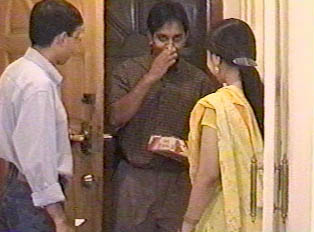LangMedia
Bangla in Bangladesh
Greetings and Partings

When peers greet one another, it is with a simple, informal “hello,” and maybe a hug. However, between a younger person and an elder, or two older people, or two business associates, a more formal greeting is used. The Islamic greeting used would translate, “May peace be upon you.” One replies “May peace be upon you, too.”
In Bangladesh, shaking hands is not a tradition, although it is sometimes done among more internationalized urban dwellers. Rather, one touches one’s forehead lightly while giving a brief nod as a gesture of respect during greetings or partings. The video shows an entering guest giving the traditional greeting to the woman, and then giving the traditional greeting to the host, followed by the less-traditional handshake when the host offers his hand.
The terms “bhai,” meaning brother, and “apa,” meaning sister, are used generously during greetings as well as in conversations with strangers where one is asking for directions, or even bartering at the market. The use of these words is not only a measure of respect, but also a sign that one person is making a deeper connection to the other. These are terms that travelers and foreigners can use in order to show respect for the culture.
A traditional Islamic farewell is “Kodah hafez,” which loosely translates to mean, “May God keep you safe.” Another farewell literally translates into “I’m coming;” however, in context it means that the person is actually leaving but only wishes to allude to coming again. When parting, people should keep the thought that there will be a return, even when both parties know that they may not see one another again for a long time.
Videos
-
"A Guest"Transcript document:
